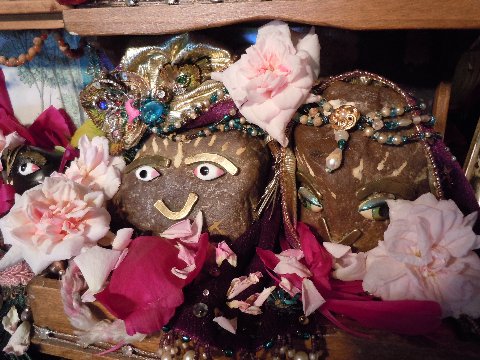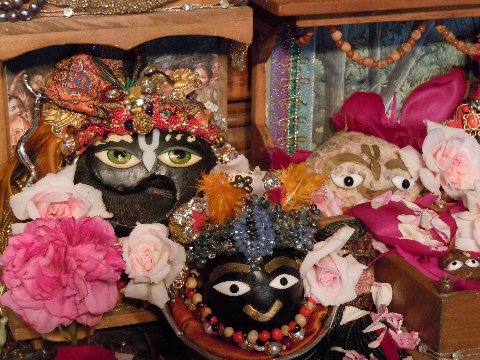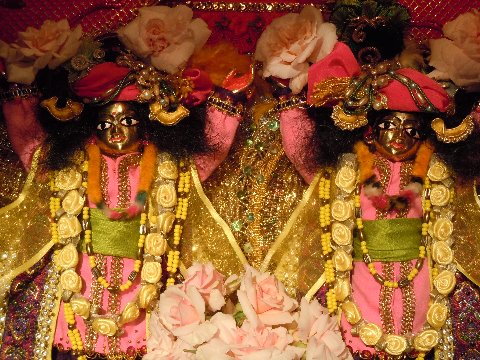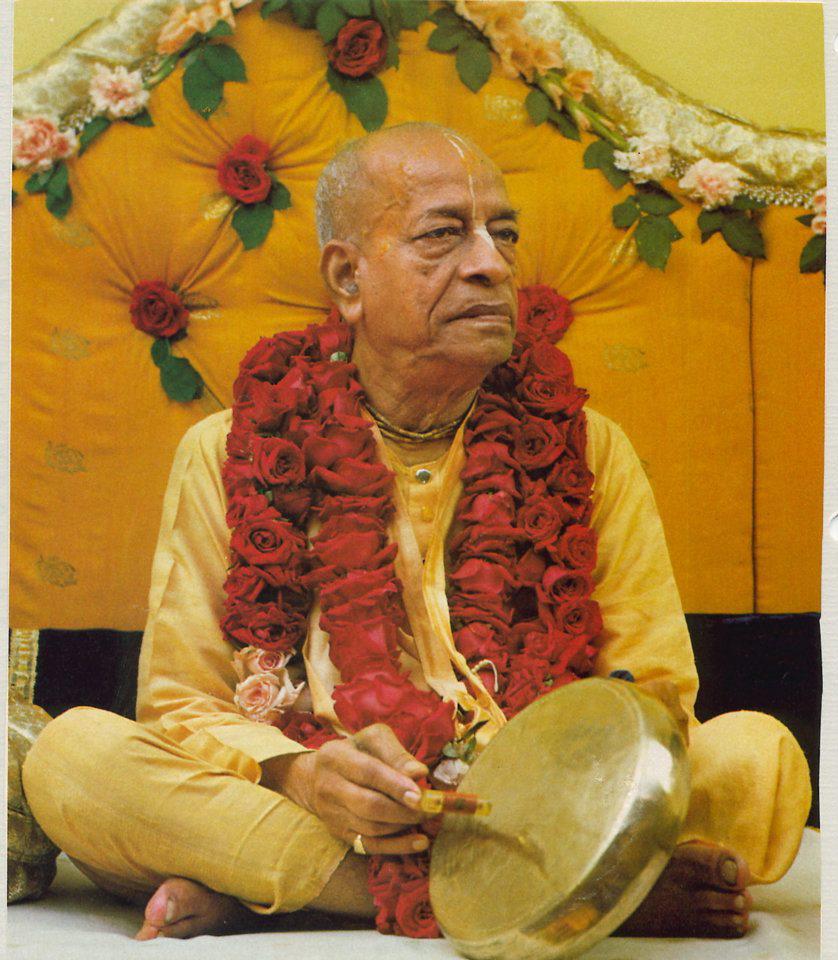What is the Hare Krishna Society?
What is the Hare Krishna Society?
In the early days of Srila Prabhupada’s mission in the West, some ISKCON leaders wanted to install teletype machines in all the temples, but Srila Prabhupada did not approve of the idea. He expressed concern that his neophyte students would use the machines for politics and gossip and thus waste time.
”…The installing of telex communications for our main temples is not required. Then they will gossip more through the telex….” Srila Prabhupada letter, February 5, 1977
Today it is practically seen that many ignorant persons posing as preachers hide behind their computer screens and spread unfounded allegations against devotees or try to raise doubts about the activities and purposes of bona fide sangas of Srila Prabhupada’s disciples. Those with a political agenda, and other ignorant or malicious persons, sometimes spread false allegations about Srila Prabhupada’s faithful disciples and thus commit the offense know as sadhu-ninda. Sadhu-ninda can quickly ruin one’s forward progress in devotional service. By hearing malicious rumors about disciples of Srila Prabhupada and by accepting and tolerating such nonsense without challenge or protest, internet surfers and sufferers may disrupt their forward progress on the path of bhakti-yoga.
“…Anyone who is a bona fide preacher of the cult of Śrī Caitanya Mahāprabhu must be respectful to the real devotees of Lord Caitanya; one should not be envious, considering one preacher to be very great and another to be very lowly. This is a material distinction and has no place on the platform of spiritual activities…”
Sri Caitanya-caritamrta – 1975 Edition Adi 10.7 :
“… If a Vaiṣṇava, by the mercy of the Lord, is empowered by Him to distribute the Lord’s holy name all over the world, other Vaiṣṇavas become very joyful-that is, if they are truly Vaiṣṇavas. One who is envious of the success of a Vaiṣṇava is certainly not a Vaiṣṇava himself, but an ordinary mundane man. Envy and jealousy are manifested by mundane people, not by Vaiṣṇavas. Why should a Vaiṣṇava be envious of another Vaiṣṇava who is successful in spreading the holy name of the Lord? An actual Vaiṣṇava is very pleased to accept another Vaiṣṇava who is bestowing the Lord’s mercy. A mundane person in the dress of a Vaiṣṇava should not be respected but rejected. This is enjoined in the śāstra (upekṣā). The word upekṣā means neglect. One should neglect an envious person. A preacher’s duty is to love the Supreme Personality of Godhead, make friendships with Vaiṣṇavas, show mercy to the innocent and reject or neglect those who are envious or jealous. There are many jealous people in the dress of Vaiṣṇavas in this Kṛṣṇa consciousness movement, and they should be completely neglected. There is no need to serve a jealous person who is in the dress of a Vaiṣṇava. When Narottama dāsa Ṭhākura says chāḍiyā vaiṣṇava sevā nistāra payeche kebā, he is indicating an actual Vaiṣṇava, not an envious or jealous person in the dress of a Vaiṣṇava…”
Sri Caitanya-caritamrta – Madhya-lila 1.218
Over the years, a few antagonistic persons have tried to malign the Hare Krishna Society for ridiculous and selfish reasons. Some persons have apparently felt slighted by HKS because of our strict policy to ignore the various vitiated “iskcon” groups, the various members associated with these groups, senior devotees who are still confused about Srila Prabhupada’s instructions, and other misguided persons associated with various other groups, such as branches of the former Gaudiya matha. (See references below.)
We also tend to avoid persons who are obsessed with the idea of trying to reform corporate iskcon’s clerics. We also avoid those who want to advertise and exaggerate the alleged faults of specific devotees, particularly those who are unpretentious preachers who know the siddhanta. Because we refrain from involvement in drawn out, rambling discussions on the internet with persons who are misguided or antagonistic, some devotees feel slighted. (See references below.) We feel the best way to deal with various misguided persons is to teach the truth about Srila Prabhupada and His instructions. If we attack something, we attack the sin and the sinful idea rather than all the individual sinners. We generally avoid discussing individuals—unless we are forced to do so. We have enough to do to explain the fundamentals of Krishna consciousness to innocent devotees who have been misled by bogus preachers.
“…If one hears the activities of Śrī Caitanya Mahāprabhu with this faith, he can be freed from his envious position. Śrīmad-Bhāgavatam is meant for such nonenvious persons (nirmatsarāṇāṁ satām)….”
Sri Caitanya-caritamrta Madhya-lila 9.362 :
Our positive agenda is to preach the glories of Lord Caitanya, Srila Prabhupada and the bona fide parampara. In the course of preaching correctly about the mission and teachings of the Krishna consciousness movement all opposing elements are defeated naturally. It is not HKS policy to attack and expose individual leaders for their sinful secret lives and extravagance. This is not practical. Nor is it advised in shastra to chase after and try to reform unrepentant deviants. We naturally expose obvious deviations in siddhanta and sadhana by preaching the truth. (See references below.)
HKS generally avoids direct confrontation with the fallen branches of iskcon. Some persons criticize us for 1) not attacking iskcon, 2) attacking iskcon, 3) not being under a gbc, 4) not supporting devotees who attack iskcon leaders, 5) supporting those who attack Iskcon leaders, 6) creating an organization separate from iskcon, and so on. (See references.)
What does it mean to be Surrendered to God?–SP
Rags to riches story-and then some
A jobless man applied for the position of ‘office boy’ at Microsoft. The HR manager interviewed him then watched him cleaning the floor as a test. ‘You are employed’ he said. Give me your e-mail address and I’ll send you the application to fill in, as well as date when you may start.
The man replied ‘But I don’t have a computer, neither an email’. ‘I’m sorry’, said the HR manager. If you don’t have an email that means you don’t exist. And who doesn’t exist, can’t have the job.’
The man left with no hope at all. He didn’t know what to do, with only $10 in his pocket. He then decided to go to the supermarket and buy a 10Kg tomato crate.
He then sold the tomatoes in a door to door round. In less than two hours, he succeeded to double his capital. He repeated the operation three times, and returned home with $60.
The man realized that he can survive by this way, and started to go every day earlier, and return late. Thus, his money doubled or tripled every day. Shortly, he bought a cart, then a truck, and then he had his own fleet of delivery vehicles.
5 years later, the man is one of the biggest food retailers in the US. He started to plan his family’s future, and decided to have a life insurance.
He called an insurance broker, and chose a protection plan.
When the conversation was concluded the broker asked him his email. The man replied, ‘I don’t have an email.’
The broker answered curiously, ‘You don’t have an email, and yet have succeeded to build an empire. Can you imagine what you could have been If you had an e mail?!!’ The man thought for a while and replied, ‘Yes, I’d be an office boy at Microsoft!’
Below is some spring pictures right now of the garden fields and basically getting it all ready
No more upadhis-material designations
Jaya Srila Prabhupada
Most everyone thinks that if he or she gets a nice birth in a nice family, has good looks, education and some wealth, then all this has been Divinely bestowed upon him by God. But from the spiritual perspective all these things are no more than gifts of the illusory energy, Maya. These things keep us trapped in the bodily conception of life. We see that is true when we hear the story of Nalakuvera and Manigriva, the sons of Kuvera. They were both devas or demigods, and they were devotees of some sort of the Supreme Lord, but because of the easy life their material benedictions gave them, they condemned themselves to a life of debauchery. They misused their material assets which is quite natural for one in that position.This is what naturally happens for most if one takes to the field of material piety instead of trying to purify the heart, thru bhakti yoga, of all the (unwanted) anarthas present.
Lessons from Kishkindya (Part 2): “Vaisnavas Live Forever”
The Vijayanagar Empire
In my first article on Kishkindya Kshetra I mentioned that this area was the former center of the famous Vijayanagar Empire, which historians believe was the most opulent empire on Earth in the last three thousand years. The whole empire suddenly declined, shortly after the disappearance of Sri Caitanya Mahaprabhu, and was sacked by a conspiracy of three other kings around 1565 AD. Mysteriously, no other kingdom, city or town every reemerged at Hampi, its capital. This empire reached its zenith during the times of Lord Caitanya, under the leadership of the renowned Vaisnava emperor, Krishna Deva Raya, who is adored in the region to this day. Interestingly, he was born and departed this world around the same dates as Lord Caitanya. He was the son-in-law and ally of Lord Caitanya’s great devotee Maharaja Prataparudra.
This powerful empire based at Hampi helped make the whole of South India a safe place for pilgrims. Had this not been the case, Lord Caitanya’s confidential associates might have found it even more difficult, or nearly impossible, to allow Him to leave on His long tour of South India with only one servant. Lord Caitanya had preferred to go alone, but His devotees, specifically Lord Nityananda, begged Him that if He was unwilling to go with a party of Vaisnavas, He should at least take one brahmacari servant who could assist Him without breaking His mood of manifesting full ecstatic symptoms of nama-sankirtana all over South India.
Most western people come to Hampi to tour the ruins of the Vijayanagar Empire or view the amazing scenery, but many Indians come here with the understanding that this unique tirtha on the banks of Tungabhadra Nadi is highly sacred. I have met Christian and Muslim pilgrims here who also appreciate the powerful sanctity of the Hampi area and visit regularly.
Lord Caitanya Visits Kishkindya
Srila Krsnadas Kaviraja Goswami
mentions in Sri Caitanya-caritamrita that Lord Caitanya did not manifest His spiritual potencies in Navadvipa Dhama but waited until he went to South India. In this connection Srila Prabhupada cites Srila Bhaktivinoda Thakura saying there are three principle dhamas of Gauidiya Vaisnavas: Vrindavan, Navadvipa and Jagganath Puri, or South India. The whole of South India is considered the third principle dhama of Gaudiya Vaisnavas, along with Jagganath Puri itself.
“Lord Sri Caitanya Mahaprabhu did not manifest His spiritual potencies at Navadvipa, but He did manifest them in South India and liberated all the people there.”
(Cc. Madhya 7.109)
Lord Caitanya visited Kishkindya and bathed at Pampa Sarovar, where there is an ancient temple of Sri Lakshmi Devi and a large temple tank with granite steps all around. The pond is crystal clear and overgrown with lotuses. Not much detailed information about Sri Caitanya Mahaprabhu’s visit here is found in Gaudiya Vaisnava literature, but the Kishkindya-vasis and local sadhus say He used to chant japa under a large mango tree at Pampa Sarovar. This tree survived until recently when some electrical workers mistakenly cut it down. Many of the local residents are the descendants of the great souls who were liberated when Lord Caitanya toured South India and visited Kiskindya Kshetra, where He manifested His full spiritual potencies through hari-nama sankirtana. To this day the fortunate people of Kishkindya spontaneously chant the holy names of Hare Rama and Hare Krishna.
GBC vs. Prabhupada: Heresies of the Governing Body Commission Rejected
The Iskcon GBC philosophy on guru-tattva and initiations has evolved over the years. In the late 1970s and early 80s, they conceded, due to the insistence of a few leading members, that eleven individuals had been appointed and empowered by Srila Prabhupada to act as zonal acharyas in Iskcon. The GBC conceded that these eleven could create their own authority structure called “The Acharya Board”. The GBC agreed that only these eleven could be initiating spiritual masters in Iskcon and, in the future, only they could appoint other spiritual masters, or diksa-gurus, from among their disciples or Godbrother followers.
In the latter part of the 1980s, after few of the “chosen eleven” fell down and went insane, these contentions were overturned under mounting pressure from a so-called guru reform movement. GBC reformists decided that these eleven “Iskcon acharyas” could no longer be zonal autocrats above the authority of the GBC. The GBC resolved that only a majority vote of the GBC body would have authority to sanction and regulate initiating spiritual masters in Iskcon. They resolved that any devotee sanctioned by the GBC could initiate his own disciples in Srila Prabhupada’s mission, and they recommended that “diksa-gurus” no longer accept elaborate public worship in Iskcon temples and titles and prayers meant for maha-bhagavatas. They thus tried to reduce the power and ritual status of “Iskcon acharyas” while opening the door for all senior preachers “in good standing” to covet the post of “Iskcon guru”. In this way the GBC quelled the “guru reform movement” within Iskcon.
GBC resolutions regarding initiations and guru-tattva have been inconsistent and contradictory. It is hard to find two “Iskcon gurus”, GBC members, or Iskcon devotees with the exact same views on these topics. New devotees often doubt whether the praises they sing to the spiritual master at mangala-arotika and guru-puja should be directed toward their so-called Iskcon guru or to Srila Prabhupada. Should they hear primarily from Srila Prabhupada, or more from their “living guru”? Should they offer prayers and worship to a picture of their “guru” on the altar before doing Deity worship or offering food? If so, would he even know? Are all prayers to the spiritual master just ritualistic hyperbole that can be applied to any so-called Iskcon (or gaudiya math) “guru”?
Below is summary of the stance of the GBC today and in the recent past, with samples of their clearly implied philosophical ideas that are against the teachings of Srila Prabhupada. Immediately after each GBC idea, we have provided the correct understanding of guru-tattva and diksa according the Srila Prabhupada’s books, conversations, letters, and classes. Authorized references are cited at the end. Throughout Srila Prabhupada’s books there are many dozens of references similar to the few cited below.
GBC: The spiritual master may be a self-made guru who is nominated by his peers or followers and sanctioned by the GBC, an ecclesiastical board. There is no need for a direct, specific order from Srila Prabhupada to become a diksa-guru in Iskcon.
Srila Prabhupada’s siddhanta: “A guru can become guru when he is ordered by his guru. That’s all. Otherwise nobody can become guru.” (See below references 1, 2 and 10.)
GBC: Srila Prabhupada authorized the GBC to sanction and dismiss diksa-gurus in ISKCON.
SPS: “Mundane votes have no jurisdiction the elect a Vaisnava acharya. A Vaisnava acharya is self-effulgent, and there is no need of any court judgment.“ Prabhupada authorized the GBC to select (or dismiss) representatives (ritviks), who initiate on His behalf. No one can be guru without the direct order of Krishna or His perfect devotee. (See below references 1, 2, 10 and 15.)
GBC: Lord Caitanya gave a blanket order for every devotee to initiate his own disciples.
SPS: Lord Caitanya ordered His followers to become “gurus” by asking everyone they meet to chant Hare Krishna. He never ordered all devotees to initiate their own disciples. Even Lord Caitanya’s eternal associates, like Sri Gadadhara Pandita, refused to initiate disciples without a direct order from Lord Caitanya. Many great devotees never initiated their own disciples. (References 2 and 3.)
GBC: Persons who are not self-realized souls or topmost Vaisnavas can be diksa-gurus if the GBC approves.
SPS: “Only a topmost devotee, a maha-bhagavata, is eligible to occupy the post of guru.” (See below reference 4.)
GBC: Spiritual masters must be sanctioned, overseen, regulated and, if necessary, disciplined by the GBC.
SPS: The genuine spiritual master is never to be regulated or disciplined by ecclesiastical boards. (See below reference 5.)
GBC: A spiritual master may sometimes fall down and become demoniac.
SPS: “There is no possibility that a first-class devotee will fall down…” — “The bona fide spiritual master is in the disciplic succession since time immemorial.” (See below references 6 and 18.)
GBC: One may ignore, neglect, or reject his spiritual master who falls from grace with the GBC.
SPS: A genuine disciple never rejects his spiritual master. (See reference 7.)
GBC: A student of Krishna consciousness may select any spiritual master, according his or her personal tastes and the ecclesiastical conventions current in Iskcon.
SPS: “Srila Jiva Goswami advised that one not accept a spiritual master in terms of hereditary or customary social and ecclesiastical conventions. One should simply try to find a genuinely qualified spiritual master for actual advancement in spiritual understanding.” (See below reference 8.)
GBC: There are dozens of gurus in Iskcon and each is entitled to his or her own ideas and opinions.
SPS: “Guru is one. He has no independent ideas or opinions.” (See reference 9.)
GBC: Iskcon gurus who have fallen down, if rectified, may be reinstated by the GBC.
SPS: “A bona fide spiritual master is in the disciplic succession from time eternal, and he does not deviate at all from the instructions of the Supreme Lord.” (See below reference 10.)
GBC: There are various levels of spiritual masters, or diksa-gurus, and not all are uttama-adhikaris.
SPS: “The spiritual master is always considered either one of the confidential associates of Radharani or a manifested representation of Sri Nityananda.” Only such a Vaisnava can impart transcendental knowledge into the heart of a disciple. (See below references 4, 7 and 11.)
GBC: The bona fide spiritual master dies, like all mortal men, and thus becomes useless in the matter of initiating and guiding students of Krishna consciousness.
SPS: “The spiritual master is eternal…” — “He lives forever through his divine instructions, and his follower lives with him.” — “He reasons ill who tells that Vaisnavas die!” (See reference 12.)







